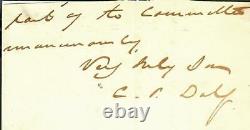
- Home
- Character
- Material
- Bone China (22)
- Brass, Crystal (7)
- Bronze (11)
- Cardboard, Paper (11)
- Ceramic (10)
- Ceramic & Porcelain (11)
- Ceramic, Porcelain (7)
- Crystal (506)
- Crystal, Glass (29)
- Glass (40)
- Gold (13)
- Lace (8)
- Lead Crystal (12)
- Linen (20)
- Metal (12)
- Paper (11)
- Pewter (7)
- Porcelain (104)
- Wood (15)
- Wool (7)
- ... (1189)
- Occasion
- Pattern
- Size
- Subject
Court of Common Pleas Charles P. Daly Hand Signed 3X5 Card



"Court of Common Pleas" Charles P. Daly Hand Signed 3X5 Card. September 19, 1899 was a member of the.
New York State Assembly, Chief Justice of the New York Court of Common. Pleas, president of the American. Geographical Society, and an author of several.O'Dalys of County Galway, Ireland. 1814, two years before Daly's birth, his parents immigrated to the U. From Omagh, County Tyrone, Ireland. Daly was born in New York, New York, USA.
His father, Michael, had been a master carpenter in. Ireland, but in New York City, he worked as the manager of a hotel on Broadway.His mother, Elizabeth, died when Daly was age three. Daly attended private school in his early years. Father's death, Daly was unwilling to rely on a widowed stepmother, leading him. To leave school and earn a living.
He worked first as a clerk. In Savannah, Georgia, before becoming a. During his three years as a sailor, he was present. At the 1830 capture of Algiers. The New York Literary Society where he learned how to debate.Becoming a law student and he was admitted to practice law in 1839. 1843, Daly was elected to the New York State Assembly, representing the Fourth. Ward of New York City. While in office, he staunchly supported the. The following year, Judge William Inglis' term on the.
New York Court of Common Pleas expired. On a recommendation of Governor. William Marcy, Governor William Bouck appointed Daly to the Court, beginning his term May. When the position changed from an appointed one to an elected one in. 1847, Daly ran for election and won, eventually becoming Chief Justice One of.
His most notable cases dealt with the Astor Place Riot involving William Charles Macready at the Astor Place Theatre. He served on the court for six consecutive terms. Retiring December 30, 1885 because of the constitutional age limit. Ten years later, the Court of Common Pleas was.
Abolished, the judges becoming justices of the New York Supreme. For fifteen years, starting in. 1860, he lectured on law at Columbia Law School.
1867, Daly was a member of the New York Constitutional Convention. After leaving the bench, he became a partner in the firm. Of Daly, Hoyt and Mason.

